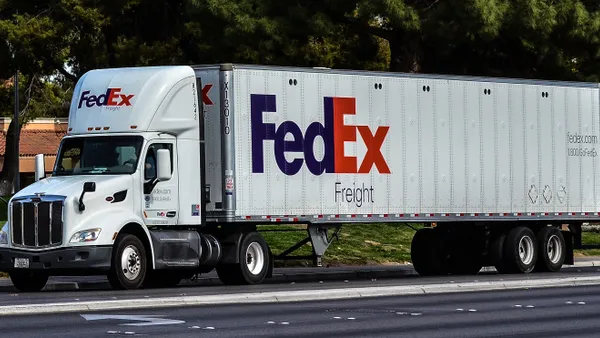Dive Brief:
- Kodiak Robotics, a Texas-based startup, has begun commercially hauling freight with autonomous trucks, the company said this week.
- Kodiak has eight autonomous trucks in its fleet, but plans to grow its operation as a carrier by adding more, the co-founders told Supply Chain Dive.
- Kodiak is focused on the "middle-mile" from the on-ramp to the off-ramp of the highway or interstate. It is currently using a safety driver to navigate everything before or after this section. The autonomous system is in control while on the highway, though the driver stays along for the ride.
Dive Insight:
Kodiak co-founder and CEO Don Burnette, who has worked on self-driving operations at both Google and Uber, said he viewed freight as the space that "was going to be the first commercially viable application of [autonomous vehicle] technology." A truck on the highway doesn't have to worry about crosswalks or cyclists, Burnette said.
"From a technical perspective, it's a much more structured environment," he told Supply Chain Dive. "I think it lends itself much more naturally to the early phases of this technology where we want to really want to tackle the on-ramp to highway to off-ramp use case."
Kodiak is currently moving a handful of loads for shippers today, according to Paz Eshel, the COO and co-founder. Eshel and Burnette declined to mention specific shippers or the kinds of freight they were hauling.
The loads are picked up at a distribution center and the driver handles the fist- and last-mile sections of the trip while the autonomy kicks in on the highway. But it won't always be like this. Once the technology is more mature there will be no need for a driver in the cab for the middle-mile portion. In the future, there could be a transfer that takes place before the highway to hand off the trailer from a truck driven by a human to a truck with no one behind the wheel.
Once the driver is out of the truck, one of the major expenses for trucking companies is gone: the trucker.
"And so that is how we perceive being able to move freight at a lower cost point than others are able to do today," Eshel said.
Without a driver behind the wheel, these trips won't just be cheaper, but autonomous trucking companies also expect them to be faster since the vehicles won't have to follow Hours of Service rules. This is a pitch made by multiple autonomous trucking companies. Earlier this year, Embark's Head of Public Policy Jonny Morris made a similar point at a supply chain event hosted by the U.S. Chamber of Commerce.
"If you imagine a vehicle that’s not limited by hours of service it will be able to make a cross country trip in a matter of two days instead of the five or six that are required by a normal human driver," Morris said.
The trucks will need to stop to refuel and to drop off freight, but otherwise, the systems will be able to monitor the roadway nonstop, Burnette said.
Kodiak is working to increase the size of its fleet "from a handful of trucks to many more trucks" and is ramping up testing operations at its Texas facility, Burnette said.
"Currently, our plan is to actually become a carrier," he said. "We actually want to move freight. We think we're [in] the best position to understand, maintain, update and ultimately operate our technology. And so our current plan and path forward is to actually become a freight carrier and move freight using our self-driving technology."














